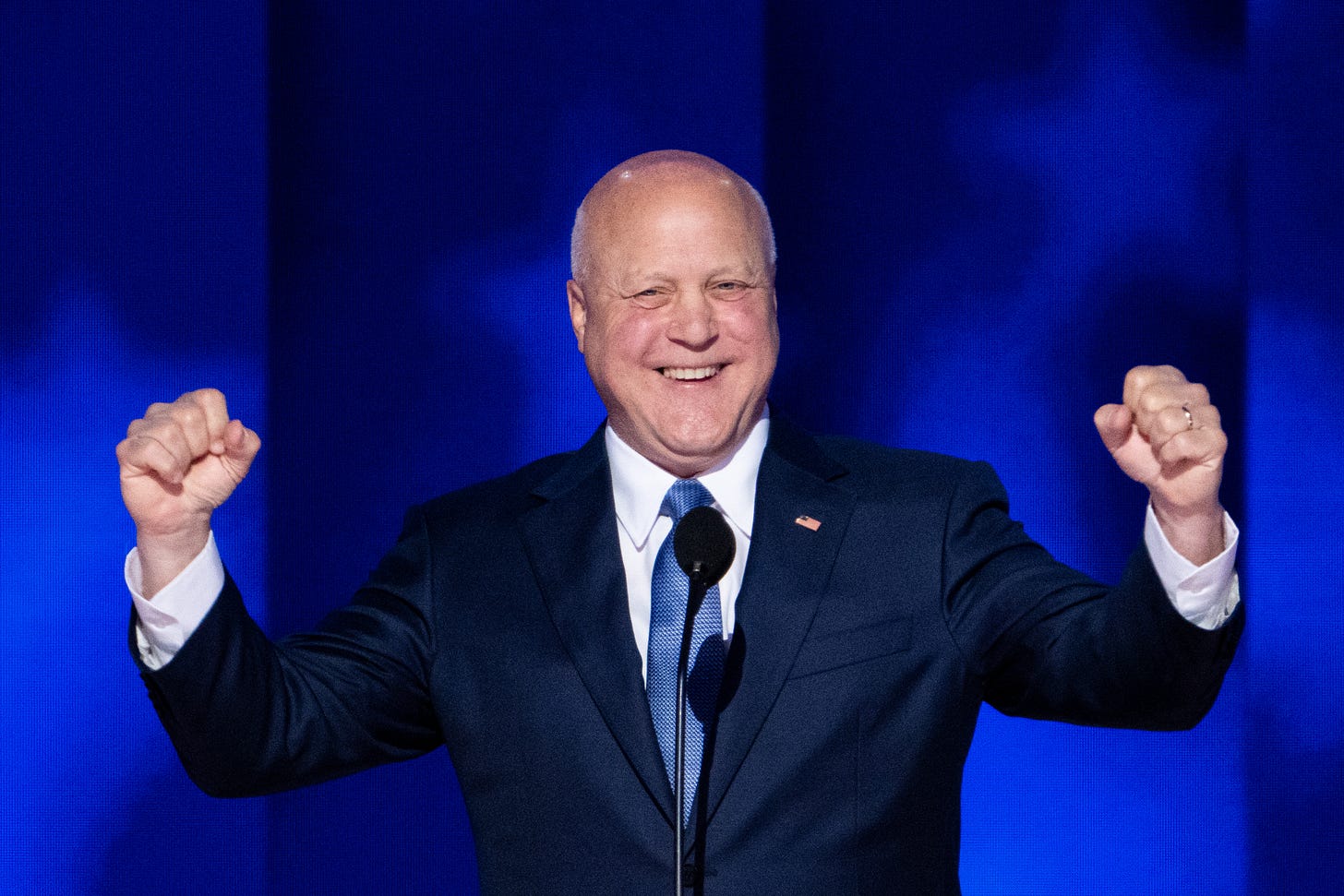
Panic! At The Dow Lows
April 23, 2025
Trump Doesn’t Want You To See This
April 23, 2025MITCH LANDRIEU, THE FORMER NEW ORLEANS mayor and senior adviser to President Joe Biden, was stunned on election night when the race was called for Donald Trump. But the second gut punch came later, when voter data rolled in showing the Democratic party had lost working-class voters—something that had not happened just four years earlier.
Now, Landrieu is on a mission to figure out what went wrong.
“If you want to win, and it’s all about math, you got to figure out how to get people that you used to have that you lost,” Landrieu said in an interview with The Bulwark. “And one of the big groups that is standing out is working-class voters.”
Few if any problems facing the Democratic party are more existential than the drift of working-class voters away from them. Once the reliable core of the party, those voters have moved dramatically right since Donald Trump burst onto the scene. Democrats have launched a number of initiatives to try and win them back over—with little success. It is Landrieu, who co-chaired Kamala Harris’s presidential campaign, who is now leading what is perhaps the most ambitious effort to understand why that working-class voter shift happened and why they so dislike the Democrats’ brand.
Along with a team of pollsters and researchers—as well as other party luminaries, including former Democratic National Committee Chair Tom Perez and former Texas Rep. Colin Allred—Landrieu has launched what he called the “Working Class Project.” As part of the effort, he’s traveling around the country—including to places that he says Democrats have neglected for far too long, like Kansas and South Carolina—meeting with labor and faith leaders and overseeing research projects on topics like media-consumption habits. His team is conducting dozens of focus groups and they are keeping the party updated on the findings via a new—you guessed it—Substack.
“There is no question that we are in a deep hole. And the first thing we have to do is stop digging, and the second thing we have to do is get ourselves out of it. And that has to be intentional. It’s got to be focused,” Landrieu said.
At this juncture, much of what Landrieu has outlined for the Working Class Project may give off the hint of consultant-driven fodder. His answers seem designed to avoid angering other Democrats even as he insists they have a problem that’s killing them politically. Plus, it’s unclear what another study or research project can do for the Democratic party. Similar initiatives were tried in 2017, 2018, 2019, and 2023—and yet the party has continued to bleed support from working-class voters. Exit polls from 2024 show that Trump won voters making less than $100,000, making him the first Republican since the 1960s to win a majority of Americans in the lowest-income bracket.
Other PACs and organizations are already pledging to invest resources in the 2026 cycle to address the party’s shortcomings. But Landrieu is, for now, merely in the research phase. He presents himself as a cancer specialist who has spotted the tumor but isn’t yet ready to prescribe the chemo. The party, he said, must “properly diagnose the illness before we can begin treatment.”
Landrieu had just wrapped up focus groups in Richmond and Virginia Beach when he spoke with The Bulwark. He said his team was about halfway through the initial round of focus-group interviews and will talk to some of the same people again over the coming months to see how they’re responding to the Trump administration’s record and to Democrats’ messages. The Working Class Project is primarily focused on Biden-to-Trump voters in twenty-one states, from traditional battlegrounds to states where Democrats will need to be more competitive in the coming years due to population shifts.
“What’s surprising about it is how alienated they feel,” Landrieu said, when asked what stood out to him so far. “It’s not like, ‘Listen, we could have gone one way or the other, and we just thought the Republicans had a better story this time.’ They were really negative on Democrats.”
He recounted the sort of thing he and his colleagues had been hearing: “[Democrats] talk past us. They don’t see us. They focus way too much time on issues that, while maybe important, are not significant to our day-to-day lives. And we want them focused on what matters to us. And what matters to us most is our pocketbook.”
Landrieu said he is not going to draw any conclusions until the project has completed its research in a few months. But an early takeaway is that Democrats suffer from a major cultural disconnect with working-class voters. Even when the party delivers important policy achievements, they’ve been unable to talk about it effectively.
Of course, Landrieu didn’t need focus groups to tell him that. He had firsthand experience.
Before becoming co-chair of Harris’s campaign, Landrieu spent two years at the White House as Biden’s infrastructure implementation coordinator overseeing $1 trillion in investments for projects like broadband and new roads, bridges, and ports. He traveled to nearly 150 cities in the role to tout the Bipartisan Infrastructure Law and the thousands of jobs it created. There was a belief in the White House and the Democratic party that Biden would be rewarded politically for delivering on a major legislative accomplishment that had a tangible impact on people’s lives.
But deliverism failed to deliver for the Democrats.
And in hindsight, Landrieu says he understands why.
“All 73,000 projects don’t touch 180 million people. The thing that touches 180 million people is the day-to-day stuff that people deal with, which is high prices at the gas station, high mortgage rates,” he said. “Politically, we were incorrect in not addressing the microeconomic feelings and anxieties of the public, because those are the things that many, many, many millions of Americans touched every day where the infrastructure stuff didn’t.”
Hanging over Landrieu’s initiative is the uncomfortable reality that simply putting back together Biden’s winning coalition from 2020 will very soon not be enough for the Democratic party to remain competitive in Congress or at the presidential level. Americans are increasingly moving out of blue coastal states to the Southeast. If those trends hold, there will be a major redistribution of political power to the South following the 2030 census.
Landrieu said the party has not fully come to terms with the implications of these demographic changes. He lamented that for years, Democrats have neglected rural areas and red states which he said “gets to be self defeating.” As the Working Class Project views it, competing in more places, particularly more red states, works in tandem with winning back working-class voters and changing the perception that Democrats are the party of educated elites.
“The idea there is to play the politics of the future,” said Landrieu, who was elected twice as the lieutenant governor of Louisiana. “You just gotta go fish where the fish are.”
— Well, it was a big day for 80-year-old Democrats from Illinois to announce their retirement.
After 44 (!!!) years in Congress, Illinois Sen. Dick Durbin announced that he would not seek re-election. In an interview with the New York Times, Durbin said that “there comes a point where you have to face reality that this is the time to leave for me.” Politico also reported today that Illinois Rep. Jan Schakowsky will announce next month that she will not seek re-election.
Durbin’s retirement was expected. But the Schakowsky news came as a bit more of a surprise. (Although I will note that things could change; Schakowsky said a statement tonight that she has “not made a decision” but will make an announcement on May 5.) Loyal readers of this newsletter will recall from the last edition that Democratic operatives had some conflicting feelings about Schakowsky and whether younger leaders should primary the 80-year-old lawmaker. Looks like she might opt to take matters into her own hands.
— In an episode of Talk Easy with Sam Fragoso that aired this week, Sen. Elizabeth Warren (D-Mass.) was asked if she regretted defending President Joe Biden’s mental acuity during his presidential campaign. Warren’s answer is, well, uncomfortable to watch. She said that her remarks at the time were what she “believed to be true” and reiterated that Biden was “sharp” and “on his feet.” Fragoso quickly points out that “on his feet” isn’t exactly high praise. The bar should probably be a bit higher for the president of the United States. As much as Democrats want to turn a page on 2024, the Biden questions are not going away.
— As my colleague Adrian Carrasquillo writes in today’s edition of Huddled Masses, there’s been a lot of debate among Democrats about how much they should focus on Trump’s deportation agenda instead of pocketbook issues like tariffs. But some Democrats are pushing back, arguing that it’s a false choice.
“It’s really important for Democrats to talk about multiple things at once,” said California Rep. Robert Garcia, who was among a group of House Democrats that traveled to El Salvador this week. “We can fight for relief and due process for the wrongfully incarcerated, we can fight billionaires like Elon Musk, and oppose the destruction of our federal agencies.”
— I’ll be honest, I have not yet watched Pete Buttigieg’s appearance on comedian Andrew Schulz’s Flagrant podcast (it’s almost three hours long), but it’s in my queue! This is one of the first post-2024 examples of a Democrat wading into the manosphere (yes, the term sucks; no, Gavin Newsom’s podcast does not count) and I’m curious to see how Pete handles it. (Speaking of Schulz, The Bulwark’s very own Tim Miller has some thoughts.)
— The Ice Bucket Challenge is back. Hell yeah.
— New York magazine asks: Alex Soros takes control of his father’s empire. What will he do with his influence?
Great Job Lauren Egan & the Team @ The Bulwark Source link for sharing this story.





